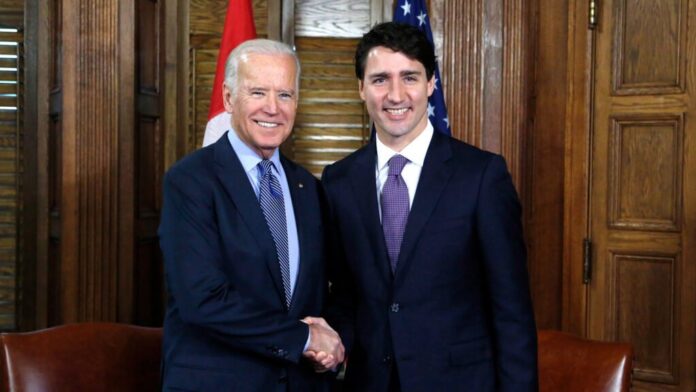The head of a prominent Canada-U.S. business group says she sees the spark of an agreement to allow Canadian companies to qualify for President Joe Biden’s controversial tax credit for electric vehicles.
“You know, I did see some wiggle room in the language and the rhetoric we saw coming from the president as well as key members of Congress,” said Scotty Greenwood, a former American diplomat to Canada who’s now CEO of the Canadian-American Business Council.
Greenwood told CBC’s The House in an interview airing this weekend that Biden wasn’t prepared to negotiate with Prime Minister Justin Trudeau at the North American Leaders’ Summit in Washington while his $2 trillion Build Back Better bill was still moving through Congress.
But she said she saw an openness in the U.S. president’s language during a brief media availability with Trudeau on Thursday in the Oval Office — enough openness to suggest that a compromise can be reached.
“So whether it’s an exemption for union-made North American vehicles or something like that, which allows the president to continue to reach out to his base — the union workers — or some other technicality, I think there’s a way to get through,” she said.
Biden’s bill, which was passed by the House of Representatives on Friday and now heads to the Senate, would give buyers of electric vehicles made in the United States by union workers a tax credit of up to $12,500.
Canada fiercely opposes the plan, insisting it undermines the auto industry in this country and violates the new North American free trade deal.
Some members of the Trudeau cabinet have warned already of possible retaliation.
International Trade Minister Mary Ng was in Washington for the summit. In a separate interview with The House, she deflected questions about how Canada might retaliate and whether the Trudeau government would impose counter-tariffs — as it did when former president Donald Trump imposed tariffs on steel and aluminum made in Canada back in 2018.
“I think it’s premature at this particular point,” Ng said, adding that Biden and other Democrats are absolutely clear on Canada’s position that this tax credit must be changed. “And we will not stop until we reach a solution that is acceptable to Canada.”
No movement yet from Washington
Trudeau, Ng and other cabinet ministers at the summit repeatedly stressed the deep integration of the North American auto industry. They also pointed out that Canada is the primary source of many raw materials needed to make batteries, such as cobalt and nickel.
But in the face of all those arguments about the importance of protecting those supply chains, U.S. officials appear unmoved.
“I’ll just state there was a very comprehensive discussion of supply chains, integration, cooperation,” Assistant Secretary of State Brian Nichols said Friday in a briefing with reporters from Canada, the U.S. and Mexico.
“The president and the prime minister did discuss the concerns that Canada has, and we look forward to working with them across a full range of issues. Obviously, we have some differences of opinion on these issues, but we have a great relationship … and we’re going to work through all of the issues that we have, and we’re going to use the treaty and trade frameworks that we have to do so.”
‘He can’t back away’
There’s also a political reality to acknowledge south of the border.
Polls suggest more Americans now disapprove of Biden’s performance. Auto-building states such as Michigan and Ohio are key swing states as Americans head into mid-term elections for the House of Representatives and Senate next year.
A protectionist president, promising and delivering more manufacturing jobs, would be less of a drag on those Democrats running for re-election in 2022.
“He can’t back away from his commitments to union workers,” Greenwood told The House. “That’s why I think there could be a compromise that has to do with North American [EVs] as long as you keep your faith with unions.”
The larger concern for Canada is how to deal with the growing protectionist movement south of the border. That movement is now embraced by both Democrats and Republicans, even if Biden’s preference for buyer incentives like tax credits is a far cry from the punitive tariffs used repeatedly by Trump while he was in office.
Greenwood acknowledges protectionism is on the rise around the world, but rejects the suggestion that the policies of the Biden and Trump administrations amount to the same thing.
© Dustin Chambers/Reuters Former U.S. president Donald Trump used a national security exemption to impose tariffs on Canadian exporters.
“I don’t think that President Biden would use a national security exemption … to try to gain leverage in a negotiation,” she said. “He’s more respectful. He’s more based on facts.”
Facts are stubborn things. But they can also be used to suit a purpose.
Right now, the fact is that Canada sees the EV tax credit as harmful to the auto industry in this country. Canada sees it as a threat to the thousands of jobs on both sides of the border as Canada and the United States work on a shared goal of reducing greenhouse gas emissions.
Ng said Canada will continue to lobby for an exemption at both the White House and on Capitol Hill, and at every other opportunity she and other cabinet ministers get with their U.S. counterparts.
“I think we left Washington where it is very clear how important this issue is for Canadian workers and for Canadian manufacturers.”
Source: CBC News








